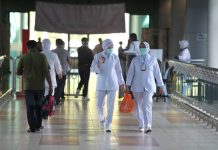Singapore aims to become the place where world’s best AI talents gather, under renewed national AI adoption strategy
In a future where artificial intelligence (AI) becomes pervasive, Singapore aims to become a place where the world’s top AI creators congregate, and where AI-focused start-ups can rapidly experiment with such technology within a trusted regulatory environment. In such a world, government data can also be “unlocked” to be used by AI for the public good, to address global issues such as population health and climate change, for example.
This is what is envisioned under the second national AI strategy (NAIS 2.0), which was unveiled by Deputy Prime Minister Lawrence Wong on Monday. “In our refreshed strategy, we will aim high, we will dream big and we will set ambitious goals. We will foster a spirit of boldness, experimentation and innovation in our next phase,” he said. “At the same time, our ambitions are rooted in reality. We are acutely aware that every leading city in the world today wants to be an AI hub. The competition is fierce and will only get tougher. “Singapore is a tiny little island with no natural resources. We cannot compete head-on in terms of size or fiscal resources. But we do have several factors in our favour: A highly skilled workforce, a highly wired-up society and, importantly, a trusted ecosystem where things work, and where we can make things happen.”
The updated strategy outlined how AI can be used to address today’s challenges and boost Singapore’s collective economic and social potential over the next three to five years. The Ministry of Communications and Information (MCI) as well as the Smart Nation Group said in a joint media release that the strategy will be continually reviewed by the authorities to “respond to fast-moving developments in AI across domains”. The plan laid out how the Government would “centrally orchestrate” efforts to support AI activity across the economy and society, and partner with the private sector, academics, non-profit organisations, Singaporeans and other stakeholders to achieve the goal of harnessing AI for the public good, they said at a media briefing. The Smart Nation Group is a department in the Prime Minister’s Office that guides Singapore’s digital transformation and leads the development of smart nation strategies.
The refreshed strategy set out Singapore’s plans to build a thriving AI ecosystem, develop the workforce to take on these opportunities, while providing enough infrastructural capacity to achieve these ambitions. It also outlined how Singapore seeks to build an environment that fosters AI innovation while protecting users. Mr Wong said that recent advances in AI have “precipitated many important conversations about the potential of AI, its harms and even on what it means to be human”. “Singapore may be a small island state, but we have big dreams and plans. We will participate fully in AI research and deployment, to do things that were not possible before, and bring benefits to ourselves and others outside Singapore,” he added. “With recent advances, especially in generative AI, we have seen the spectrum of possibilities expanding tremendously,” Mr Wong said. “Singapore believes in the long-term potential of AI. Our aspiration is to fully leverage AI’s capabilities to improve our lives. That is why we have updated our National AI Strategy and we are launching this updated strategy today.”
Singapore had recently also begun deploying AI in various areas such as trialling the use of generative AI in Singapore’s courts and the planned deployment of more AI tools in schools. These technologies must be “responsibly and sustainably” managed to guard against potential ill effects or misuse, MCI and Smart Nation Group said. The Government is committed to build a trusted AI ecosystem in a “new era of AI”, one in which AI would be “indispensable” to Singapore’s prosperity and global relevance, MCI and Smart Nation Group said in their statement.
The renewed strategy aims to do so in three areas:
1. Developing “peaks of excellence”
The Government will partner with industry and public researchers to develop “select peaks of excellence” in AI aimed at transforming the economy and society, MCI and Smart Nation Group said.
There are plans to anchor new AI centres of excellence across companies and to explore establishing such centres in certain key sectors.
Singapore will also strengthen its startup ecosystem to attract AI-focused “accelerator programmes” in a bid to spur rapid experimentation with the technology.
The Government also aims to improve public service productivity through AI, such as by rolling out courses for all public officers to “uplift baseline AI literacy and sharpen AI proficiency”, the strategy’s report stated.
2. Building Singapore as a “home” for AI creators, practitioners and users
Tight-knit knowledge communities are critical to AI innovation, as they drive the exchange of ideas and expertise for research and the impactful use of AI, MCI and Smart Nation Group said.
The strategy aims to grow the pool of AI practitioners in Singapore and to upskill the workforce through “sector-specific AI training programmes”.
A total of 15,000 AI practitioners are sought under the plan. The Government aims to meet this target by re-designing existing apprenticeship programmes and working with AI product development teams to boost the number of company attachments.
Singapore will also focus on attracting the world’s top AI creators — including more top-tier researchers and engineers.
The report stated that this will take “novel value propositions”, through means such as hybrid Singapore-overseas working arrangements, part-time appointments across industry and academia, and partnerships with international research institutions or companies.
3. Ensuring AI “works the way it should”
“Successful AI value creation” would require a conducive infrastructure and facilitative environment — one where all stages of the AI life cycle are well-supported and “everything works the way it should”, MCI and Smart Nation Group said.
To facilitate this, the authorities will avail and “unlock” government data for AI innovation and public good.
The report did not state what data can be used, but said that these will be in areas where there are meritorious “public good” use cases, particularly if these are aligned with Singapore’s national priorities but are not commercially attractive. “This will ensure that such projects do not fall through the cracks,” it added, noting that AI activity is built upon access to high quality and relevant datasets.
Such a move will also ensure that Singapore’s regulatory environment for AI is trusted and “fit-for-purpose”, where people can engage with the technology with confidence and contribute to international AI developments.






















